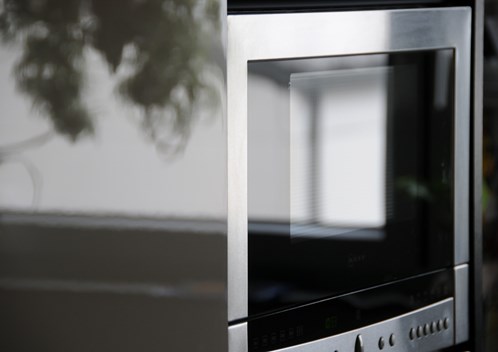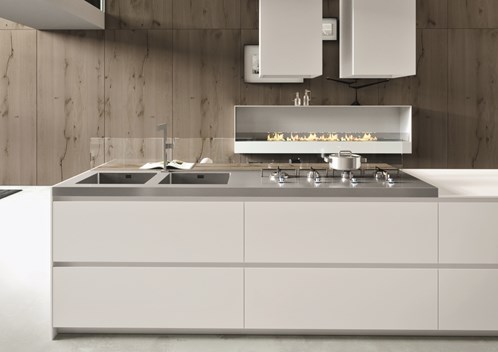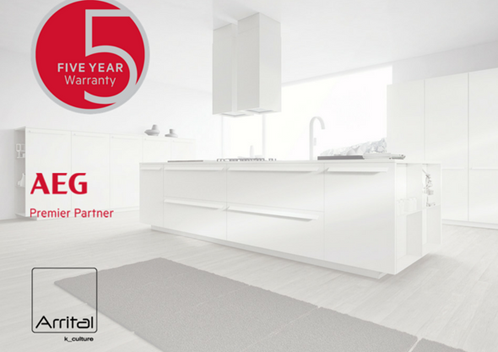Kitchen finishes explained

When it comes to finishes for your kitchen there are a multitude of choices you can make for both your doors and worktops which will set the tone of your kitchen.
From striking natural wood to modern composites or stainless steel, all the options you choose all have their pros & cons, it’s up to you to decide what works for you.
Here we explain some of the more common options available to you:
Solid Wood
What is it? It is as it says, a big old chunk of tree.
The classic, warm look provided by a solid wood kitchen worktop can look amazing in both contemporary and classic kitchens, but as a work surface, it needs a little more care than others.
Although hardwoods are chosen for worktops, mostly oak or walnut, digs and scratches can quite easily occur. Using a sharp knife directly on the surface is a no, no as is placing hot pans as scorching is common. To keep this surface looking great regular oiling to seal your surface is important and also helps keep it hygienic.
That all the said the imperfections and the wear and tear of the surface add to the uniqueness and history. Solid wood is a durable surface and correctly maintained, will age with style.
Wood Veneer
What is it? A veneer is where a thin strip of wood is glued to other strips or materials to create a flat panel, whether that’s a cabinet door or worktop or even a floor.
Using wood veneer in a kitchen is very popular and there are hundreds of striking looks that can be created. As a veneer only uses a thin slice of wood, the cost is much reduced from the solid wood alternative and so is also an eco-friendlier approach.
Wood veneer finishes can, however, be susceptible to water damage if not looked after properly, and unlike solid wood, which could be sanded to remove blemishes, cannot be repaired in the same way.
Veneers are more stable than solid wood as they are less likely to bow our bend and do not require constant maintenance, like real wood.
Composite/Solid Surface
What is it? A composite surface is made up of more than one material with there being two main types
1) Quartz composite worktops, which commonly, is quartz combined with resin and
2) Solid Surface which is a combination of materials, including plastic, resin and minerals - the original and most well-known being Corian® .
Composite kitchen finishes are becoming very popular due to the fact they are hard wearing and cost effective.
The quartz composite worktops take on the durability of the stone at its core and due to its non-porous nature, it means there is no overhead of sealing or other maintenance. Scratch and stain resistant, the work surface should, however, be protected from very hot objects.
We often use Silestones® when designing our kitchens as it offers a 25 year warranty on work surfaces.
If you’re looking for the ultimate in luxurious finishes Dekton is a great option, and it is heat, UV, stain and scratch resistant, plus antibacterial!
Corian® work surfaces are durable and can provide your kitchen with a seamless look. Their non-porous nature makes them hygienic and easy to keep clean with the surface being heat resistant but only up to 100 °C.
Scratches and digs can be repaired by having the top professionally sanded and polished.
Stainless Steel
What is it? Stainless steel is a metal alloy with strength and durability to make it a very commonly used material in all areas of modern construction.
Stainless steel is a finish more often than not seen in a professional kitchen due to it durability, hygienic and heat resistant qualities. It can also be found in a contemporary kitchen to create a very distinctive look and feel.
A stainless steel surface is very to clean, not prone to staining and requires no regular maintenance. It’s light and waterproof, however, it can easily scratch, be cold and show fingerprints making a pristine finish difficult to continually achieve.
However, there are option to purchase aged stainless and also finger proof versions.
Marble
What is it? Marble is a naturally found metamorphic rock formed from limestone.
A marble work surface adds a very classic and elegant look to a kitchen. The coolness of the smooth surface makes it great for pastry cooking and it is virtually heat resistant.
As marble is porous by nature, the surface does need regular maintenance sealing once or twice a year. Marble is easily scratched and can be marked or stained by wine, brightly colour spices, citrus acids and some cleaning products.
Granite
What is it? Granite is a naturally found igneous rock formed from underground magma.This natural stone work surface is classically beautiful and virtually indestructible work surface.
Granite can be seen in contemporary and traditional kitchens alike and whilst a durable surface it may need annual sealing as it is very slightly porous.
Whilst Granite won’t scratch, it is prone to the same issue of staining from wine and citric acids if they come into contact with the surface.
Fenix NTM
What is it? Fenix is an innovative nanotechnological material.
The use of Fenix NTM means you can have a seamless, modern kitchen with a matt surface that will never show fingerprints. The surface is heat proof, antibacterial, impact, UV and water resistant, and can self-heal any scratches with heat.
Soft to the touch this really is a durable surface, with a sensible price tag that can be used to create a truly stylish, cutting edge kitchen.
Laminate
What is it? Laminate surfaces are multi-layered with the top layer being a clear protective resin, underneath MDF or plywood and in between resin coated paper.
Laminate is the probably the lowest cost solution for your kitchen with hundreds of colour and pattern options available, even those that mimic more expensive surfaces.
Laminate surfaces are low maintenance, hard wearing and very easy to keep clean. They can, however, crack, scratch or even peel. They can’t be repaired easily and aren’t as long lasting as some of the others mentioned.
--
Take a look at our Finishes page to see all the options we have available with colours too.
If you need to some help understanding what’s what in your future kitchen, then don’t hesitate to give us a call on 01752 787131 or pop into our Plymouth showroom where our experts can help.
You May Also Like

How "tech" is your kitchen
Modern kitchens have dramatically moved on from the days when a microwave was seen as a new innovation...

Feeling warm in your kitchen
Feeling warm in your home isn’t just down to heating... At the end of this month, the clocks will go...

Arrital Kitchens are now AEG Premier Partners
Knowledge, Experience & Peace of Mind Choosing the right appliances to complement your new kitchen...
